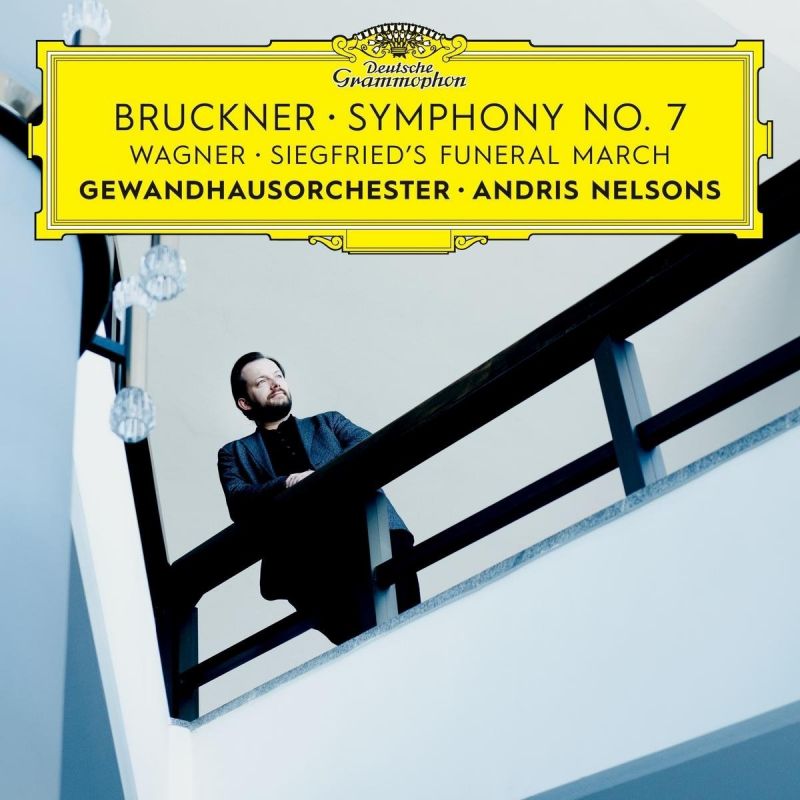BRUCKNER Symphony No 7 (Nelsons)
View record and artist detailsRecord and Artist Details
Composer or Director: Anton Bruckner, Richard Wagner
Genre:
Orchestral
Label: Deutsche Grammophon
Magazine Review Date: 07/2018
Media Format: CD or Download
Media Runtime: 77
Mastering:
DDD
Catalogue Number: 479 8494GH

Tracks:
| Composition | Artist Credit |
|---|---|
| (Der) Ring des Nibelungen: Part 4, 'Götterdämmerung', Movement: Siegfried's funeral march |
Richard Wagner, Composer
Andris Nelsons, Conductor Leipzig Gewandhaus Orchestra Richard Wagner, Composer |
| Symphony No. 7 |
Anton Bruckner, Composer
Andris Nelsons, Conductor Anton Bruckner, Composer Leipzig Gewandhaus Orchestra |
Author: Richard Osborne
And ‘line’ is the operative word, since it’s not so much the often doleful tempos which undermine this newest recording as the apparent inability of conductor Andris Nelsons to establish that all-commanding pulse without which the inner weave of the music, its constituent parts thematically and harmonically, cannot cohere.
There are two ways of projecting the symphony’s glorious first movement. One is to allow the famously long-breathed opening paragraph to establish the enabling pulse; the other is to allow this space while waiting for the B major subject, the movement’s government-in-waiting, to move the music on at bar 51. Even so, the two tempos need in some sense to coexist, which they rarely do in this stop-start, often driftless Leipzig performance. Few performances of a symphonic first movement inspire confidence that end more slowly than they begin.
The slow movement’s opening statement is taken as slowly as I ever remember it, the melodic contours limned as they might be by some over-earnest child in a tracing exercise. There’s sprightliness in the Scherzo and finale, but even here Nelsons overplays his hand, making the finale’s titanic A minor episode more an interpolation than a bold but friendly intervention.
Is the problem that too much attention is being lavished on the orchestra (all those exquisitely sounded pianissimos) and not enough on the music? Or is it simply a misreading of this particular piece, as evidenced by the bizarre decision to preface this of all Bruckner symphonies with the Funeral March from Wagner’s Götterdämmerung? True, the great slow movement ends with a threnody written under the spell of Wagner’s death; but that is no more than an episode in a work whose final movements are among the most joyous Bruckner ever wrote.
When Karajan conducted the symphony with the Vienna Philharmonic in London in 1962, a glorious performance happily preserved in excellent BBC sound on ICA, he played the Meistersinger Prelude (not preserved, alas) as an encore: programming born of instinct as well as knowledge.
Mention of that performance reminds me of another near-definitive account of the symphony, albeit a touch less robustly recorded and with less good Wagner tubas, recently recovered from a radio archive. It’s a 1964 Salzburg Festival performance in which master Brucknerian Carl Schuricht conducts the Berlin Philharmonic. Put that in your player and I’d be amazed if you don’t exclaim, ‘So that’s how the music’s meant to go’.
Discover the world's largest classical music catalogue with Presto Music.

Gramophone Digital Club
- Digital Edition
- Digital Archive
- Reviews Database
- Full website access
From £8.75 / month
Subscribe
Gramophone Full Club
- Print Edition
- Digital Edition
- Digital Archive
- Reviews Database
- Full website access
From £11.00 / month
Subscribe
If you are a library, university or other organisation that would be interested in an institutional subscription to Gramophone please click here for further information.




